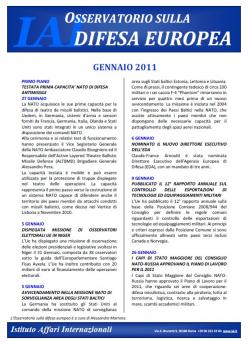Observatory on European defence, December 2003

12 December 2003
EU Council - Defence, Security Strategy, Headquarters, NATO
The EU Council held at the end of the Italian semester of Presidency, before the beginning of the Intergovernmental Conference, reached important agreements on defence matters.
The Council approved the Presidency paper, adopting the Security Strategy proposed by the High Representative Solana, previously approved on 9 December by the External Relations Council with some changes (including a wording in favour of conflict prevention rather than preemptive engagement), as well as the EU Non Proliferation Strategy.
An agreement on EU command and planning cells was reached: a European cell will be set up within the NATO SHAPE Headquarter (responsible for missions within the Berlin + framework); at the same time, an autonomous permanent cell will be created within the EU Military Staff, in charge of operations outside NATO. This structure will rely on assigned national Headquarters, while NATO will have liaison officers in the EU cell.
The agreement settled the longstanding EU-NATO dispute over headquarters; this problem was also debated at NATO meetings on 1-2 December, as well as in a NATO-EU meeting on 4 December.
Previously, a trilateral meeting between France, Germany and the United Kingdom reached a compromise on defence issues that was widely reused by the Council.
12-13 December 2003
Intergovernmental Conference - Defence, Cooperation
The Intergovernmental Conference (IGC) failed to adopt the New Constitutional Treaty, given the diverging position of Spain and Poland over the proposed qualified majority voting system.
A number of non-binding (since the Constitution was not adopted) agreements were nevertheless reached, notably in the defence sector, in particular on the collective defence provision (Art. III-214) and on structured cooperation (Art. III-213 and annex Protocol), two proposals initially opposed by some countries, such as the UK and the “neutrals”.
On 5 December, the Italian Presidency, on the basis of the results of the IGC held in Naples on 28-29 November, advanced the first proposal, followed by a revised version on 9 December.
This second version allows for closer defence cooperation between a group of willing and able countries, as long as these initiatives remain open to all members that satisfy the objective criteria established by the annex Protocol, such as a commitment to developing military capabilities in the framework of the European Defence Agency, participation in the multinational projection force, higher levels of procurement and increased interoperability.
The adoption of the new Treaty remains dependent on a general agreement and has been postponed to another IGC yet to be defined.
Therefore, the Treaty of Nice currently remains the EU legal framework; this Treaty does not allow for the development of enhanced cooperation in the defence area.
15 December 2003
EU Missions - Concordia, Proxima
As previously established by the Council, the military mission Concordia in Macedonia (FYROM) has been terminated and replaced by an EU international police mission named “Proxima”.
-
Details
Roma, Istituto affari internazionali, 2003 -
Issue
03/12


